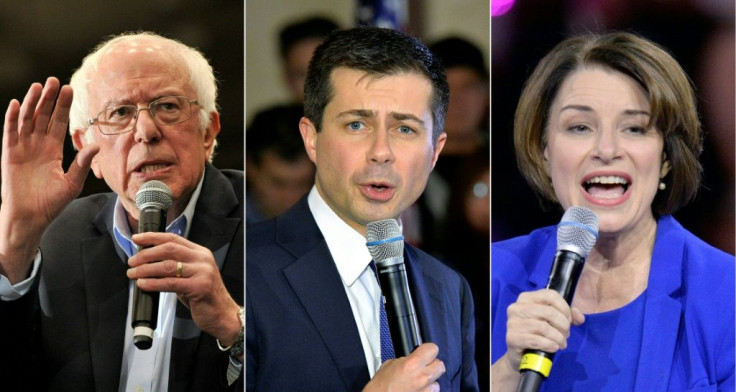One-Third Of US Voters Expected To Vote On Super Tuesday
KEY POINTS
- Liberals led moderate heading into Super Tuesday.
- How much will Mike Bloomberg's money matter on Super Tuesday?
- Bernie Sanders could walk away from Dems leader after March 3.
Fourteen states and American Samoa are scheduled to vote on March 3. They include California, with 415 delegates to the Democratic National Convention, and Texas, which has 228 delegates. More than one-third of the U.S. population is expected to vote on this Super Tuesday. Democrats will have 1,357 delegates at stake.
Sen. Bernie Sanders held a huge lead in California on FiveThirtyEight’s Feb. 14 poll with 27 percent. Former New York City Mayor Mike Blomberg and Vice President Joe Biden follow at more than 13 percent each. Sen. Elizabeth Warren receives 12.7 percent and Mayor Pete Buttigieg scores 10.5 percent. Meanwhile, Sen. Amy Klobuchar falls behind with just 3 percent after pulling off the big surprise of the New Hampshire primary.
A University of Texas/Texas Tribune poll concluded Feb. 9 showed Sanders leading the former vice president 24-22-percent with Warren trailing at 15 percent and Blomberg at 10 percent.

To look at it another way, the party’s liberal candidates leading the so-called moderates in these large states.
March 3 will mark the first time Bloomberg will appear on a Democrat primary ballot. He has already spent some $300 million on advertising targeting Super Tuesday and is expected to that amount again by March 3, according to Associated Press.
Five states are in the South. More than 50 percent of Alabama voters in the Democrat electorate primary in 2016 were cast by African-Americans. North Carolina’s voting scrolls show 22 percent are black, but more than a third of 2016 primary voters were black. Tennessee voters are more than 17 percent African-American. That could be bad news for the former News York City mayor.
He has already spent some $300 million on advertising targeting March 3 and is expected to spend another of that amount again by Super Tuesday, according to Associated Press. Bloomberg, as mayor, endorsed New York City’s stop-and-frisk policy.
“Ninety-five percent of your murders and murderers and murder victims fit one MO,” Bloomberg said at the Aspen Institute in 2015. “You can just take the description and Xerox it and pass it out to all the cops. They are male minorities 15 to 25.”
He also supported predatory lending prior to the 2008 mortgage crisis, according to NPR.
Many speculate Bloomberg is on the scene because Biden’s campaign has not taken off – again. This is the fourth time Biden has run for the job. The other moderates, Buttigieg and Sen. Amy Klobuchar, have not taken off either. Biden’s campaign is hoping for a strong showing in Feb. 29 South Carolina primary. African American voters made up 61 percent of the state’s primary electorate in 2016.
With Massachusetts, Minnesota and Vermont scheduled to vote on Super Tuesday, Warren, Klobuchar and Sanders are expected to score easy victories.
© Copyright IBTimes 2024. All rights reserved.











